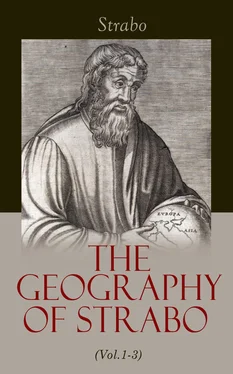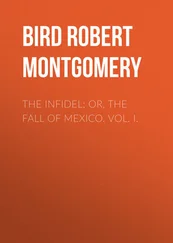4. There are also other small islands around Britain; but one, of great extent, Ierna, 1496lying parallel to it towards the north, long or rather, wide; concerning which we have nothing certain to relate, further than that its inhabitants are more savage than the Britons, feeding on human flesh, and enormous eaters, and deeming it commendable to devour their deceased fathers, 1497as well as openly 1498to have commerce not only with other women, but also with their own mothers and sisters. 1499But this we relate perhaps without very competent authority; although to eat human flesh is said to be a Scythian custom; and during the severities of a siege, even the Kelts, the Iberians, and many others, are reported to have done the like. 1500
5. The account of Thulè is still more uncertain, on account of its secluded situation; for they consider it to be the northernmost of all lands of which the names are known. The falsity of what Pytheas has related concerning this and neighbouring places, is proved by what he has asserted of well-known countries. For if, as we have shown, his description of these is in the main incorrect, what he says of far distant countries is still more likely to be false. 1501Nevertheless, as far as astronomy and the mathematics are concerned, he appears to have reasoned correctly, that people bordering on the frozen [Pg 300] [CAS. 201] zone would be destitute of cultivated fruits, and almost deprived of the domestic animals; that their food would consist of millet, herbs, fruits, and roots; and that where there was corn and honey they would make drink of these. That having no bright sun, they would thresh their corn, and store it in vast granaries, threshing-floors being useless on account of the rain and want of sun.
Table of Contents
1. Having described Keltica beyond the Alps, 1502and the nations who inhabit the country, we must now speak of the Alps themselves and their inhabitants, and afterwards of the whole of Italy; observing in our description such arrangement as the nature of the country shall point out.
The Alps do not commence at Monœci Portus, 1503as some have asserted, but from the region whence the Apennines take their rise about Genoa, a mercantile city of the Ligurians, and at the marshes named Sabatorum Vada; 1504for the Apennines take their rise near Genoa, and the Alps near Sabatorum Vada. The distance between Genoa and the Sabatorum Vada is about 260 stadia. About 370 stadia farther on is the little city of Albingaunum, 1505inhabited by Ligurians who are called Ingauni. From thence to the Monœci Portus is 480 stadia. In the interval between is the very considerable city of Albium Intemelium, 1506inhabited by the Intemelii. These names are sufficient to prove that the Alps commence at the Sabbatorum Vada. For the Alps were formerly called Albia and Alpionia, 1507and at the present day the high mountain in the country of the Iapodes, 1508next to Ocra and the Alps, is named Albius, showing that the Alps extend so far.
2. Now since the Ligurians were divided into Ingauni and Intemelii, it was natural that their maritime colonies should be distinguished, one by the name of Albium Intemelium, Alpine as it were, and the other by the more concise form Albingaunum. 1509To these two tribes of Ligurians already mentioned, Polybius adds those of the Oxybii and Deciates. 1510The whole coast from Monœci Portus to Tyrrhenia is continuous, and without harbours excepting some small roads and anchorages. Above it rise the rugged precipices of the Alpine range, leaving but a narrow passage along the sea. This district, but particularly the mountains, is inhabited by Ligurians, principally subsisting on the produce of their herds, and milk, and a drink made of barley. There is plenty of wood here for the construction of ships; the trees grow to a vast size, some of them having been found eight feet in diameter. Much of the wood is veined, and not inferior to cedar-wood for cabinet work. This wood, together with the produce of their cattle, hides, and honey, they transport to the mart of Genoa, receiving in exchange for them the oil and wine of Italy; for the little [wine] which their country produces is harsh and tastes of pitch. Here are bred the horses and mules known as ginni, and here too are wrought the Ligurian tunics and saga. In their country likewise there is plenty of lingurium, called by some electrum. 1511They use but few cavalry in war; their infantry are good, and excellent slingers. Some have thought that their brazen shields prove these people to be of Grecian origin.
3. The Monœci Portus is merely a roadstead, not capable of containing either many or large vessels. Here is a temple dedicated to Hercules Monœcus. 1512The name seems to show it probable that the Massilian voyages along the coast extended as far as here. Monœci Portus is distant from Antipolis rather more than 200 stadia. The Salyes occupy the region from thence to Marseilles, or a little farther; they [Pg 302] [CAS. 203] inhabit the Alps which lie above that city, and a portion of the sea-coast, where they intermingle with the Greeks. The ancient Greeks gave to the Salyes the name of Ligyes, 1513and to the country which was in the possession of the Marseillese, that of Ligystica. 1514The later Greeks named them Kelto-Ligyes, 1515and assigned to them the whole of the plains extending as far as Luerion 1516and the Rhone. They are divided into ten cantons, and are capable of raising troops not only of infantry, but of cavalry also. These people were the first of the Transalpine Kelts whom the Romans subdued after maintaining a lengthened war against them and the Ligurians. They closed [against the Romans] all the roads into Iberia along the sea-coast, and carried on a system of pillage both by sea and land. Their strength so increased that large armies were scarcely able to force a passage. And after a war of eighty years, the Romans were hardly able to obtain a breadth of twelve stadia for the purpose of making a public road. After this, however, the Romans subdued the whole of them, and established among them a regular form of government, and imposed a tribute. 1517
4. After the Salyes, the Albienses, the Albiœci, 1518and the Vocontii inhabit the northern portion of the mountains. The Vocontii extend as far as the Allobriges, and occupy vast valleys in the depths of the mountains, not inferior to those inhabited by the Allobriges. Both the Allobriges and Ligurians are subject to the pretors sent into the Narbonnaise, but the Vocontii are governed by their own laws, as we have said of the Volcæ of Nemausus. 1519Of the Ligurians between the Var and Genoa, those along the sea are considered Italians; while the mountaineers are governed by a prefect of the equestrian order, as is the case in regard to other nations wholly barbarous.
5. After the Vocontii, are the Iconii, the Tricorii, and the Medulli; who inhabit the loftiest ridges of the mountains, for they say that some of them have an almost perpendicular ascent of 100 stadia, and a similar descent to the frontiers of Italy. In these highlands there is a great lake; there are also two springs not far distant from each other; one of these gives rise to the Durance, which flows like a torrent into the Rhone, and to the Durias, 1520which flows in an opposite direction; for it mingles with the Po after having pursued its course through the country of the Salassi 1521into Cisalpine Keltica. From the other source, but much lower down, rises the Po itself, large and rapid, which as it advances becomes still vaster, and at the same time more gentle. As it reaches the plains it increases in breadth, being augmented by numerous [other rivers], and thus it becomes less impetuous in its course, and its current is weakened. Having become the largest river in Europe, with the exception of the Danube, 1522it discharges itself into the Adriatic Sea. The Medulli are situated considerably above the confluence of the Isère and the Rhone.
Читать дальше












![Anne Blunt - A Pilgrimage to Nejd, the Cradle of the Arab Race. Vol. 2 [of 2]](/books/750183/anne-blunt-a-pilgrimage-to-nejd-the-cradle-of-the-thumb.webp)